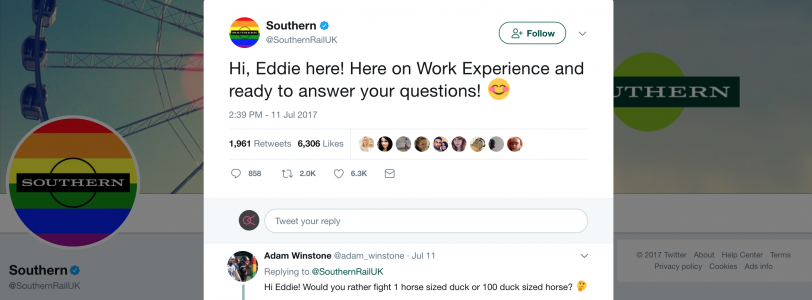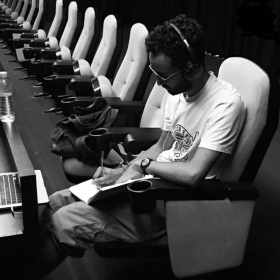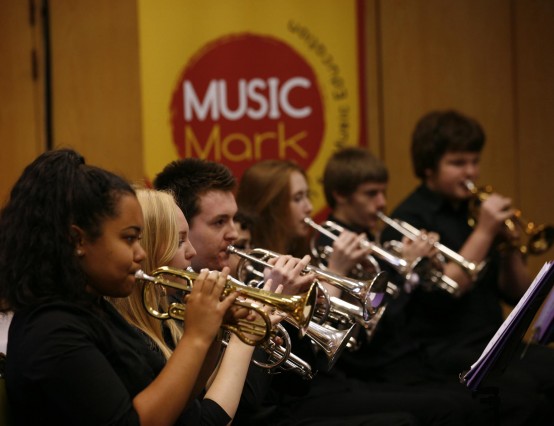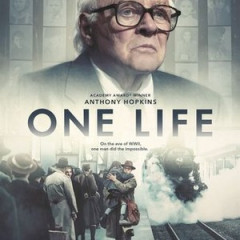The most efficient and all-encompassing route into a creative organisation is, basically, from the bottom.
It's more likely to be tea and coffee runs than #AskEddie fame but stick with it.
It's important to acknowledge the reality of the difficulty of requiring experience to get experience. Internships and work experience don't always require experience and, to be perfectly honest, inherently shouldn't require experience as entry-level positions.
However, all is not just in the job market at the moment. Nevertheless, they are popular choices for good reason. Work experience and internships that don't work your fingers to the nibs can be rewarding and deeply educational – as they should be by their very nature. But where do they come from?
You need to start at the top and feed your most geeky desires – go online and find out what your favourite companies have to offer. Tate Museums, the BBC, House of Fraser… go wild.
Even if they don't have anything you can find, or do offer something but don't accept applications until seven months from now, send them an email. Be polite and ask them for their help. Also, it's important to tell them why you're talking to them. Be complimentary but not embarrassingly flattering. Tell them about your investment in the company and that acts as a credential – passion for the craft. If you can't see any offer they have for work experience or an internship, ask them a question covering all bases: do they offer something as experience and, if not, is there something they can send your way even if it's a chat?
Of course, more morosely, if you're lucky enough to get an interview and are unsuccessful, fix your issues and reapply. Job hunting, though a soul sucking experience, builds a thick skin.
There are lots of job listings sites across different industries and listing them all would take an age. Therefore, doing your own research about these sites won't take long to come to fruition. Number one rule though: never pay for these sites. I can speak from experience looking for entry-level work across film and television that it does not increase the likelihood of you getting a position, or even an interview. Also, I can tell you for sure that the best starting point within film and television is the People looking for tv work: Runners Facebook closed group.
Be patient, be relentless, don't be scared of gradually slipping expectations around the clout of companies you apply to and don't forget to continually optimise your CV.
It is easy to jump straight into whatever work is thrown at you when you're lucky enough to get a position. Don't let them overwork you, though. But this is about getting the positions, not how to handle them when you're in there. However, this is important to keep in mind because recent controversies around work difficulty, hours, and pay have made transparency about internships and work experience schemes at companies big and small much better.
A famous example is the prestigious Vivienne Westwood internships. While 20-somethings with training in and out of fashion would sacrifice large cuts of their own bodies to have arguably the UK's greatest fashion house on their CV, we know that Vivienne Westwood's company has a rotten recent history of unpaid internships that overwork their young entrants in the industry with ear-twisting work. They now pay a number of their interns – though not yet all of them.
An unpaid internship is frowned upon but shouldn't be discounted completely. Rule number two: never pay out of your own pocket to complete an internship. You may not get paid, but if they don't even pay your expenses – travel, namely, and accommodation with bigger companies – then your time there is illegal. In addition, from the very beginning, in the online advert, it should be made perfectly clear that, if it is an unpaid position, hours are perfectly flexible, and tasks can be turned down.
A nicer famous example is the prestigious Warp Films internships. Warp Films is the BAFTA-winning film and TV production company behind This Is England and Four Lions. They offer two unpaid internships that do not cost their applicants a penny and they are clear from the beginning about learning on the job, flexible hours and reasonable requests for work.
Basically, internships and work experience are worth sitting around for a few months applying to before you get one. When you get them, make an impression and don't be duped into thinking only one will be enough and you'll be set. Network and make your aspirations known and ask the company what more they can do for you.
If work experience and internships haven't worked for you, my next piece will be on getting jobs through participation in the work organisations offer.
- Image courtesy of Twitter/SouthernRailUK









0 Comments